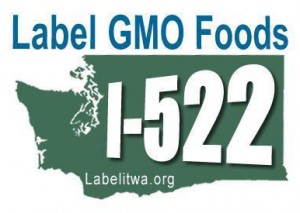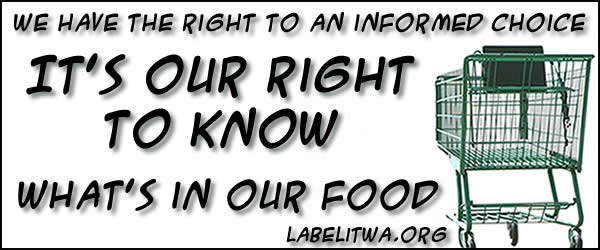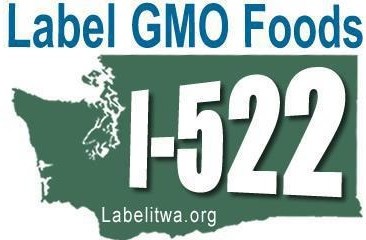(Editor’s note: This essay was posted by Devon Peña on Environmental and Food Justice, it is reposted here with permission.)

.
.
.
Consumer’s right to know and farmer’s right to farm are at stake
I-522 ADDRESSES BOTH CONSUMPTION AND PRODUCTION
Devon G. Peña | Seattle, WA
A grassroots campaign has been launched in Washington State for the adoption of a labeling law for genetically engineered foods (a.k.a. GMO or transgenic foods). The grassroots initiative seeks support for I-522, which would mandate labeling of transgenic crops or foods containing GMOs. You can read the full text of the proposed initiative below this commentary.
The I-522 movement is led by a diverse group of consumer advocates, organic farmers, and non-governmental organizations (NGOs) and has recruited a wide variety of endorsements from NGOs, municipalities, faith-based groups, farmers and farmer associations, seed savers and exchange groups, plant breeders, and well-known and respected elected officials.
The website for the I-522 campaign, which includes educational and organizing resources and detailed information on GMO foods, is available at this link: http://www.labelitwa.org/. Over 350,000 signatures from registered voters were submitted to the Washington Secretary of State on January 3, 2013. State law required 241,153 valid signatures of registered Washington voters, so we safely passed the threshold.
California was the last state to attempt, via citizens’ initiative, passage of a labeling law for transgenic crops or foods containing transgenic materials. That campaign took place during the 2012 election cycle and came close to a victory. The gene giants (Monsanto, DuPont) and other agribusiness and grocery corporations and lobbying interest groups poured close to $47 million into the “No on Prop 37” campaign and thus managed to defeat the measure by a vote of 51.5 to 48.5 percent.
Lessons learned from the California campaign are being applied in Washington to avoid a repeat defeat of this initiative. There is a campaign underway in New Mexico where grassroots consumer and farmer organizations and activists are working with the state legislature on a labeling law. The New Mexico law, SB-18, was introduced by State Senator Peter Wirth and includes the provision, “A genetically modified food product that is offered for sale in the state shall be labeled to indicate that the product contains genetically modified material. The information shall be displayed in a manner that is conspicuous and easily understandable to consumers.” (Section 4.A)
According to The New York Times, the initiative campaign in Washington and legislative efforts in New Mexico are joined by legislation to label GMOs recently introduced in Connecticut, Missouri, and Vermont.
One of the many reasons that I have endorsed I-522 is its explicit language acknowledging the need to protect farmworkers: “These toxic herbicides damage the vitality of the soil, contaminate drinking water supplies, and pose health risks to consumers and farmworkers” under Section 1 (13).
For every progressive movement for the labeling of transgenic foods or the dismantling of confined animal feeding operations (CAFOs) or “factory farms,” there are quote formidable forces of reaction that represent a broader threat to lour democracy. For example, at least 28 states have adopted legislation making it o pass a law making it an “act of terrorism” to engage in direct action protests that interfere with animal breeding or factory farming. Much of this legislation is aimed at animal rights activists but there are also efforts to extend this type of repressive laws to protests and direct actions against GMO producers. In one analysis of this sort of totalitarian legislation, Cynthia Hodges of the Michigan State University School of Law notes how most of the “animal terrorism” statutes apply to a very wide range of activities:
Animal terrorism laws generally forbid entering an animal facility with the intent to commit a prohibited act. An “animal facility” is typically any location where an animal is kept for agricultural production, or for educational or scientific purposes. This could be a pasture or a pen, a laboratory, or a vehicle or pond where an animal is kept, shown, bred, used in research, testing, or for food or fiber production. Examples include livestock markets, zoos, rodeos, circuses, amusement parks, hunting preserves, horse and dog show grounds, research facilities, and veterinary clinics. A building used to store supplies, records, data, or equipment relating to animal research, testing, production, or education or an organization with the primary purpose of promoting or marketing livestock or livestock products could also qualify as an “animal facility.”
Of course, the American Legislative Exchange Council (ALEC), a Koch brothers-funded group, has been behind these draconian efforts some of which make it a crime to report or make complaints against factory farms. I am told that the effort to ban criticism of factory farming will soon be extended to criticism of GMO foods. A full-blown Constitutional confrontation is clearly in the works since these state laws are an attack on our First Amendment free speech rights.
In the coming weeks and months I will be offering full coverage of this initiative as the battle heats up and the corporate money starts to pour in to defeat the citizen’s initiative. Some activists have called for greater reliance on state legislation but the current political composition of the Washington state legislature likely means that any progressive legislative approach would be defeated. In the meantime, please support the Washington I-522 campaign and visit the website at: http://www.labelitwa.org/.

Text of I-522
Complete Text of I-522 “The People’s Right to Know Genetically Engineered Food Act”
AN ACT Relating to disclosure of foods produced through genetic engineering; adding a new chapter to Title 70 RCW; and prescribing penalties. BE IT ENACTED BY THE PEOPLE OF THE STATE OF WASHINGTON:
NEW SECTION. Sec. 1. The people find that:
(1) Polls consistently show that the vast majority of the public, typically more than ninety percent, wants to know if their food was produced using genetic engineering. Without disclosure, consumers of genetically engineered food unknowingly may violate their own dietary and religious restrictions.
(2) Currently, there is no federal or state law that requires food producers to identify whether foods were produced using genetic engineering. At the same time, the United States Food and Drug Administration does not require safety studies of such foods. Unless these foods contain a known allergen, the United States food and drug administration does not require the developers of genetically engineered crops to consult with the agency. Consultations with the United States food and drug administration are entirely voluntary and the developers themselves may decide what information they may wish to provide.
(3) Mandatory identification of foods produced with genetic engineering can provide a critical method for tracking the potential health effects of consuming foods produced through genetic engineering.
(4) Consumers have the right to know whether the foods they purchase were produced with genetic engineering. The genetic engineering of plants and animals is an imprecise process and often causes unintended consequences. Mixing plant, animal, bacterial, and viral genes in combinations that cannot occur in nature produces results that are not always predictable or controllable, and can lead to adverse health or environmental consequences.
(5) United States government scientists have stated that the artificial insertion of genetic material into plants, a technique unique to genetic engineering, can cause a variety of significant problems with plant foods. Such genetic engineering can increase the levels of known toxicants in foods and introduce new toxicants and health concerns.
(6) Forty-nine countries, including Japan, South Korea, China, Australia, New Zealand, Thailand, Russia, the European Union member states, and other key United States trading partners, have laws mandating disclosure of genetically engineered foods on food labels. Many countries have restrictions or bans against foods produced with genetic engineering.
(7) No international agreements prohibit the mandatory identification of foods produced through genetic engineering.
(8) Numerous foreign markets with restrictions against foods produced through genetic engineering have restricted imports of United States crops due to concerns about genetic engineering. Some foreign markets are choosing to purchase agricultural products from countries other than the United States because genetically engineered crops are not identified in the United States, making it impossible for buyers to distinguish what does or does not meet their national labeling laws or restrictions, rendering United States’ products less desirable. Trade losses are estimated at billions of dollars. Mandatory identification of foods produced with genetic engineering can be a critical method for preserving the economic value of exports to markets with restrictions and prohibitions against genetic engineering.
(9) Industry data shows foods identified as produced without genetic engineering, including conventional foods identified this way, are the fastest growing label claim. Consumers have a right to an informed choice at the point of sale.
(10) Farmers from a wheat growing region of the state have gathered more than two thousand six hundred signatures on a petition demanding mandatory disclosure for crops produced with genetic engineering. The farmers are concerned they will lose their wheat export markets if genetically engineered wheat is approved.
(11) Agriculture is Washington’s number one employer and wheat is Washington’s number two export crop, second only to goods and services produced by the Boeing company, and ahead of Microsoft, which ranks third.
(12) Preserving the identity, quality, and reliability of Washington’s agricultural products is of prime importance to our state’s fiscal health.
(13) The cultivation of genetically engineered crops can cause serious impacts to the environment. For example, most genetically engineered crops are designed to withstand weed killing herbicides. As a result, genetically engineered crops have caused hundreds of millions of pounds of additional herbicides to be applied to the nation’s farmland. The massive increase in use of these herbicides has caused emergence of herbicide-resistant weeds, which have infested farm fields and roadsides, complicating weed control for farmers and encouraging use of increasingly toxic and more dangerous herbicides. These toxic herbicides damage the vitality of the soil, contaminate drinking water supplies, and pose health risks to consumers and farmworkers. The public should have the choice to avoid purchasing foods produced in ways that can lead to such harm.
(14) United States department of agriculture data shows Washington state ranks second in the nation for organic farm-gate sales at two hundred eighty-one million dollars per year. While total United States food sales are virtually stagnant, growing less than one percent overall, the organic food industry grew at 7.7 percent according to 2010 data. Sales of organic fruits and vegetables increased eleven and eight-tenths percent, accounting for approximately twelve percent of all United States’ fruit and vegetable sales. Organic dairy, another key industry in Washington state, grew at nine percent and comprises nearly six percent of the total United States dairy market. Organic farmers are prohibited from using genetically engineered seeds or livestock feed.
(15) Trade industry data shows the organic industry is creating jobs at four times the national rate.
(16) Published data shows organic farming is more profitable and economically secure than conventional farming over the long term. This important element of Washington’s economy must be protected.
(17) Conventional farmers have a right to choose what crops they grow and many conventional farmers want to grow traditional crops developed without genetic engineering. Identifying seeds and seed stock produced with genetic engineering would protect farmers’ rights to know what they are purchasing and protect their right to choose what they grow.
(18) The purpose of this chapter is to ensure people are fully informed about whether the food they purchase and eat was produced through genetic engineering so they may choose for themselves whether to purchase and eat such food. Identifying foods produced through genetic engineering also will help protect our state’s export market.
NEW SECTION. Sec. 2. The definitions in this section apply throughout this chapter unless the context clearly requires otherwise.
(1) “Department” means the Department of Health.
(2) “Enzyme” means a protein that catalyzes chemical reactions of other substances without itself being destroyed or altered upon completion of the reactions.
(3)(a) “Genetically engineered” means any food that is produced from an organism or organisms in which the genetic material has been changed through the application of: (i) In vitro nucleic acid techniques including recombinant deoxyribonucleic acid techniques and the direct injection of nucleic acid into cells or organelles. In vitro nucleic acid techniques include, but are not limited to, recombinant deoxyribonucleic acid or ribonucleic acid techniques that use vector systems and techniques involving the direct introduction into the organisms of hereditary material prepared outside the organisms, such as micro-injection, macro-injection, chemoporation, electroporation, micro-encapsulation, and liposome fusion; or (ii) fusion of cells, including protoplast fusion, or hybridization techniques that overcome natural physiological, reproductive, or recombination barriers, where the donor cells or protoplasts do not fall within the same taxonomic family, in a way that does not occur by natural multiplication or natural recombination.
(b) For the purposes of (a) of this subsection, “organism” means any biological entity capable of replication, reproduction, or transferring genetic material.
(4) “Processed food” means any food other than a raw agricultural commodity and includes any food produced from a raw agricultural commodity that has been subject to processing such as canning, smoking, pressing, cooking, freezing, dehydration, fermentation, or milling.
(5) “Processing aid” means:
(a) A substance that is added to a food during the processing of the food but is removed in some manner from the food before it is packaged in its finished form;
(b) A substance that is added to a food during processing, is converted into constituents normally present in the food, and does not significantly increase the amount of the constituents naturally found in the food; or
(c) A substance that is added to a food for its technical or functional effects in the processing but is present in the finished food at insignificant levels and does not have any technical or functional effect in that finished food.
(6) “Raw agricultural commodity” has the same meaning as defined by 21 U.S.C. Sec. 321.
NEW SECTION. Sec. 3. (1) Beginning July 1, 2015, any food offered for retail sale in Washington is misbranded if it is, or may have been, entirely or partly produced with genetic engineering and that fact is not disclosed as follows:
(a) In the case of a raw agricultural commodity, on the package offered for retail sale, with the words “genetically engineered” stated clearly and conspicuously on the front of the package of such a commodity, or in the case of such a commodity that is not separately packaged or labeled, on a label appearing on the retail store shelf or bin where such a commodity is displayed for sale;
(b) In the case of any processed food, on the front of the package of such food produced by a manufacturer, with the words “partially produced with genetic engineering” or “may be partially produced with genetic engineering” stated clearly and conspicuously; and
(c) In the case of any seed or seed stock, on the seed or seed stock container, sales receipt or any other reference to identification, ownership, or possession, with the words “genetically engineered” or “produced with genetic engineering” stated clearly and conspicuously.
(2) Subsections (1) and (3) of this section do not require either the listing or identification of any ingredient or ingredients that were genetically engineered, nor that the term “genetically engineered” be placed immediately preceding any common name or primary product descriptor of a food.
(3) Subsection (1) of this section does not apply to any of the following:
(a) Food consisting entirely of, or derived entirely from, an animal that has not itself been genetically engineered, regardless of whether the animal has been fed or injected with any food produced with genetic engineering or any drug that has been produced through means of genetic engineering;
(b) A raw agricultural commodity or food that has been grown, raised, produced, or derived without the knowing and intentional use of genetically engineered seed or food. To be included within the exclusion under this subsection, the person supplying a raw agricultural commodity or food must provide a sworn statement that the raw agricultural commodity or food: (i) Has not been knowingly or intentionally produced through genetic engineering; and (ii) has been segregated from, and has not been knowingly or intentionally commingled with, foods that may have been genetically engineered at any time. In providing such a sworn statement, a person may rely on a sworn statement from his or her own supplier that contains such an affirmation;
(c) Any processed food that would be subject to this section solely because one or more processing aids or enzymes were produced or derived with genetic engineering;
(d) Any alcoholic beverage that is subject to regulation under Title 66 RCW;
(e) Until July 1, 2019, any processed food that would be subject to this section solely because it includes one or more materials produced by genetic engineering, provided that the engineered materials in the aggregate do not account for more than nine-tenths of one percent of the total weight of the processed food;
(f) Food that an independent organization has determined has not been knowingly and intentionally produced from or commingled with genetically engineered seed or genetically engineered food, provided that such a determination has been made pursuant to a sampling and testing procedure approved for this purpose in rules adopted by the department. These rules may not approve a sampling and testing procedure unless it is consistent with sampling and testing principles recommended by internationally recognized standards organizations, such as the international standards association and the grain and feed trade association. No testing procedure may be approved by the department unless: (i) It does not rely on testing processed foods in which no deoxyribonucleic acid is detectable; and (ii) it is consistent with the most recent “Guidelines on Performance Criteria and Validation of Methods for Detection, Identification and Quantification of Specific DNA Sequences and Specific Proteins in Foods” (CAC/GL 74, 2010) published by the codex alimentarius commission;
(g) Food that has been lawfully certified to be labeled, marketed, and offered for sale as “organic” pursuant to the federal organic foods production act of 1990 and the regulations promulgated pursuant thereto by the United States department of agriculture;
(h) Food that is not packaged for retail sale and that either: (i) Is a processed food prepared and intended for immediate human consumption; or (ii) is served, sold, or otherwise provided in any restaurant or other food service establishment that is engaged primarily in the sale of food prepared and intended for immediate human consumption; or
(i) Medical food.
NEW SECTION. Sec. 4. The department may adopt rules necessary to implement this chapter, provided that the department is not authorized to create any exemptions beyond those provided in section 3(3) of this act.
NEW SECTION. Sec. 5. (1) The department, acting through the attorney general, may bring an action in a court of competent jurisdiction to enjoin any person violating this chapter.
(2) The department may assess a civil penalty against any person violating this chapter in an amount not to exceed one thousand dollars per day. Each day of violation is considered a separate violation.
(3) An action to enjoin a violation of this chapter may be brought in any court of competent jurisdiction by any person in the public interest if the action is commenced more than sixty days after the person has given notice of the alleged violation to the department, the attorney general, and to the alleged violator.
(4) The court may award to a prevailing plaintiff reasonable costs and attorneys’ fees incurred in investigating and prosecuting an action to enforce this chapter.
NEW SECTION. Sec. 6. Sections 1 through 5 of this act constitute a new chapter in Title 70 RCW.
NEW SECTION. Sec. 7. If any provision of this act or its application to any person or circumstance is held invalid, the remainder of the act or the application of the provision to other persons or circumstances is not affected.
________________________________________
About Devon G. Peña
 A lifelong activist in the environmental justice and resilient agriculture movements, Devon G. Peña is a Professor of American Ethnic Studies, Anthropology, and Environmental Studies at the University of Washington in Seattle. He also works on the family’s historic acequia farm in San Acacio, Colorado.
A lifelong activist in the environmental justice and resilient agriculture movements, Devon G. Peña is a Professor of American Ethnic Studies, Anthropology, and Environmental Studies at the University of Washington in Seattle. He also works on the family’s historic acequia farm in San Acacio, Colorado.
A pioneering interdisciplinary research scholar and widely-cited author, his most recent books include Mexican Americans and the Environment: Tierra y Vida (U. of Arizona Press, 2005) and The Oxford Encyclopedia of Latinos and Latinas in the United States (senior editor, Oxford University Press, 2005).
Dr. Peña is the Founder and President of The Acequia Institute, the nation’s first Latina/o charitable foundation dedicated to supporting research and education for the environmental and food justice movements.
Read this article as it was originally published here.


Two points:
1. The AMA study is extremely problematic and overlooks major studies in which a wide variety of illnesses are correlated with transgenic foods including allergy reactions. One report that reviews peer-reviewed studies is “Health and Environmental Impacts of Glyphosate,”which was prepared by David Buffin and Topsy Jewell of the Pesticide Action Network UK (2001). One recent study is Nora Benachour and Giles-Eric Sefralini *2009) Glyphosate formulations induce apoptosis and necrosis in human umbilical, embryonic, and placental cells. Chemical Research in Toxicology 22:1:97-105. I could go on, as there is some very compelling evidence regarding public health and environmental impacts of GMOs.
2. The issue is not just about direct impacts on human health: The environmental impacts affecting farming systems is massive and has been suppressed or ignored by the USDA and become a taboo subject in many peer reviewed journals. I will note that many of the studies cited in the AMA compendium involved scientists with serious conflicts of interest – the majority of them undisclosed. For some recent summaries of the evidence of the ecological and agroecological impacts read Union of Concerned Scientists (2009) Failure to yield: Evaluating the performance of genetically engineered crops. There is also the just published report in Mother Jones with results of a scientific study showing that nearly half of US farms have “superweeds” that are precisely the result of overuse of glyphosate. For that, please go to: http://www.motherjones.com/tom-philpott/2013/02/report-spread-monsantos-superweeds-speeds-12-0
The American Medical Association has an excellent report on GMO specific labeling
http://www.ama-assn.org/resources/doc/csaph/a12-csaph2-bioengineeredfoods.pdf
Well worth the read for those who want to understand food labeling policy.
Thanks, Robert!
The more we know about this issue, the better!
Gail NK
Co-Publisher
GoodFood World